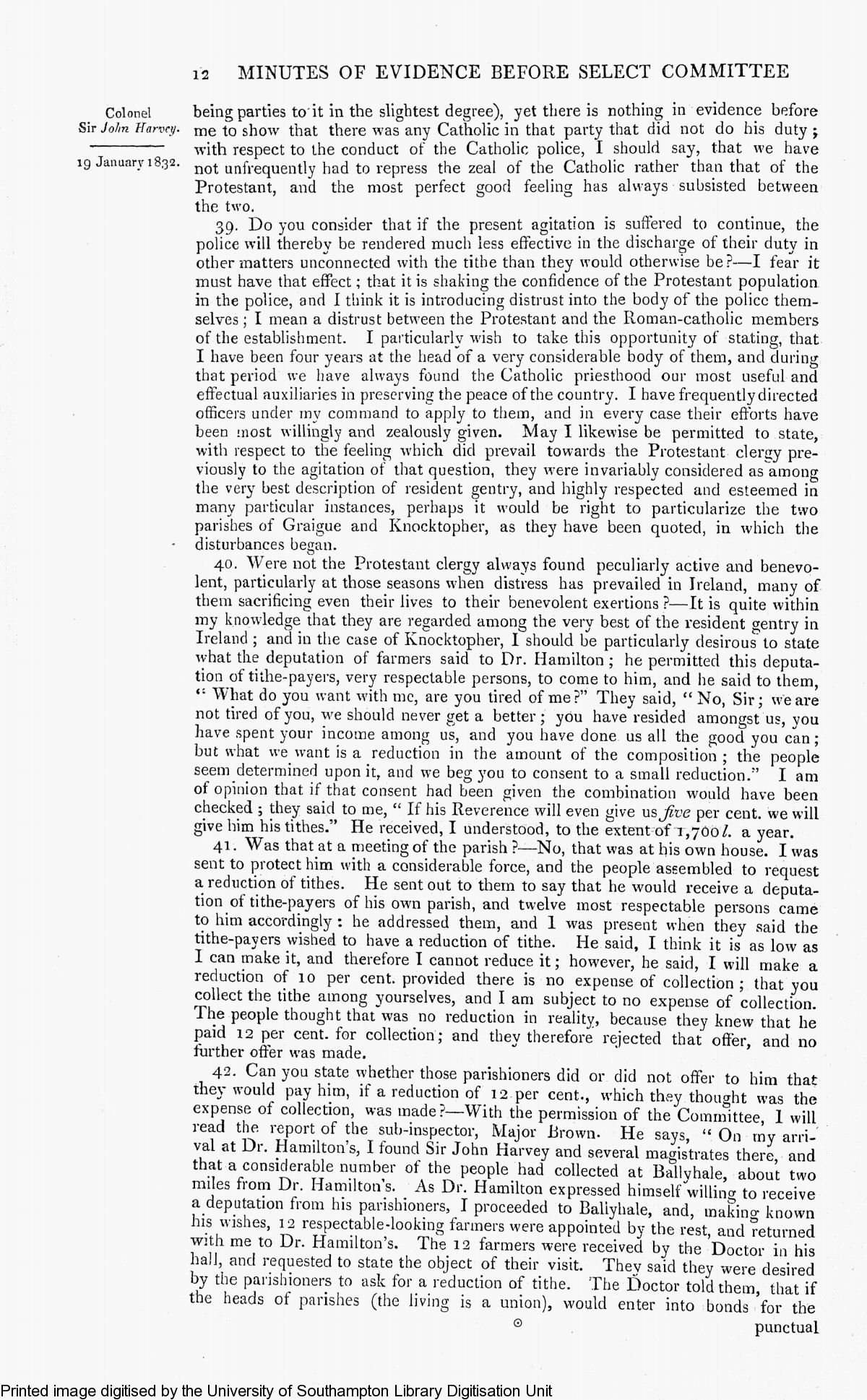12 MINUTES OF EVIDENCE BEFORE SELECT COMMITTEE Colonel being parties to'it in the slightest degree), yet there is nothing in evidence before Sir ./o/m
fTarwy.
me to show that there was any Catholic in that party that did not do his duty j
with respect to the conduct of the Catholic police, I should say, that we have 19 January 1832.
^ ^frequently had to repress the zeal of the Catholic rather than that of the
Protestant, and the most perfect good feeling has always subsisted between the two.
.
39.
Do you consider that if the present agitation is suffered to continue, the police will thereby be rendered much less effective in the discharge of their duty in other matters unconnected with the tithe than they would otherwise be?—I
fear it must have that effect; that it is shaking the confidence of the Protestant population in the police, and I think it is introducing distrust into the body of the police them-selves ; I mean a distrust between the Protestant and the Roman-catholic members of the establishment.
I particularly wish to take this opportunity of stating, that I have been four years at the head of a very considerable body of them, and during that period we have always found the Catholic priesthood our most useful and effectual auxiliaries in preserving the peace of the country.
I have frequently directed officers under my command to apply to them, and in every case their efforts have been most willingly and zealously given.
May I likewise be permitted to state, with respect to the feeling which did prevail towards the Protestant clergy pre-viously to the agitation of that question, they were invariably considered as among the very best description of resident gentry, and highly respected and esteemed in many particular instances, perhaps it would be right to particularize the two parishes of Graigue and Knocktopher, as they have been quoted, in which the
-disturbances began.
40.
Were not the Protestant clergy always found peculiarly active and benevo-lent, particularly at those seasons when distress has prevailed in Ireland, many of them sacrificing even their lives to their benevolent exertions ?—It
is quite within my knowledge that they are regarded among the very best of the resident gentry in Ireland ; and in the case of Knocktopher, I should be particularly desirous to state what the deputation of farmers said to Dr.
Hamilton ; he permitted this deputa-tion of tithe-payers, very respectable persons, to come to him, and he said to them, " What do you want with me, are you tired of me?"
They said, " No, Sir; we are not tired of you, we should never get a better; you have resided amongst us, you have spent your income among us, and you have done us all the good you can; but what we want is a reduction in the amount of the composition ; the people seem determined upon it, and we beg }*ou to consent to a small reduction."
I am of opinion that if that consent had been given the combination would have been checked ; they said to me,
" If his Reverence will even give usjfee per cent, we will give him his tithes."
He received, I understood, to the extent of 1,760/.
a year.
41.
Was that at a meeting of the parish ?—No,
that was at his own house.
I was sent to protect him with a considerable force, and the people assembled to request a reduction of tithes.
He sent out to them to say that he would receive a deputa-tion of tithe-payers of his own parish, and twelve most respectable persons came to him accordingly : he addressed them, and 1 was present when they said the tithe-payers wished to have a reduction of tithe.
He said, I think it is as low as I can make it, and therefore I cannot reduce it; however, he said, I will make a reduction of 10 per cent, provided there is no expense of collection ; that you collect the tithe among yourselves, and I am subject to no expense of collection.
The people thought that was no reduction in reality, because they knew that he paid 12 per cent, for collection; and they therefore rejected that offer, and no further offer was made.
42.
Can you state whether those parishioners did or did not offer to him that they would pay him, if a reduction of 12 per cent.,
which they thought was the expense of collection, was made?—With
the permission of the Committee, 1 will read the report of the sub-inspector, Major Brown-He says, " On my arri-val at Dr.
Hamilton's, I found Sir John Harvey and several magistrates there, and that a considerable number of the people had collected at Baliyhale, about two miles from Dr.
Hamilton's.
As Dr.
Hamilton expressed himself "willing to receive a_deputation from his parishioners, I proceeded to Baliyhale, and, making known his wishes, 12 respectable-looking farmers were appointed by the rest, and returned with me to Dr.
Hamilton's.
The 12 farmers were received by the Doctor in his hall, and requested to state the object of their visit.
They said they were desired by the parishioners to ask for a reduction of tithe.
The Doctor told them, that if the heads of parishes (the living is a union), would enter into bonds for the
©

